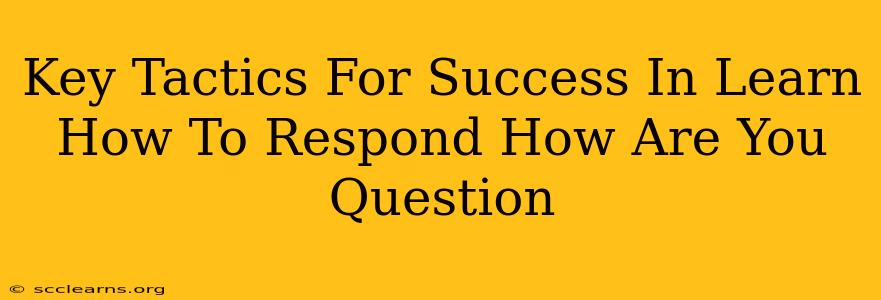The seemingly simple question, "How are you?" often presents a surprising challenge. A simple "I'm fine, thank you" might suffice in some situations, but mastering nuanced responses can significantly impact your relationships and overall communication skills. This guide provides key tactics to help you navigate this common yet crucial social interaction.
Understanding the Nuances of "How Are You?"
Before diving into responses, it's crucial to understand that "How are you?" isn't always a genuine inquiry about your well-being. Context matters!
- The Polite Inquiry: In many cases, it's a simple social greeting, similar to "Hello" or "Good morning." A brief, polite response is perfectly acceptable.
- The Genuine Inquiry: Sometimes, it's a genuine invitation to share, especially from close friends, family, or colleagues. In these cases, a more detailed and heartfelt response is appropriate.
- The Conversational Opener: It can serve as a way to start a conversation. Your response can naturally lead into further discussion.
Mastering Different Response Strategies
The key to success lies in adapting your response to the context. Here are several tactics:
1. The Concise & Polite Response
This is ideal for casual encounters and when you want to keep the interaction brief:
- "I'm good, thanks! How about you?" This is a classic and universally accepted response. It's polite, concise, and reciprocates the question.
- "I'm doing well, thank you." A slightly more formal, yet still polite and appropriate option.
- "Fine, thanks. And yourself?" Simple, straightforward, and encourages further conversation.
2. The More Detailed Response (for close relationships)
When you're comfortable sharing more, a detailed response can strengthen bonds:
- "I'm doing really well, thanks for asking! I just [mention a positive recent event or accomplishment]." Sharing positive news creates a positive interaction.
- "Things are good, but I've been a little busy lately with [briefly mention a project or situation]." This acknowledges both positive and potentially stressful aspects of your life.
- "I'm doing okay. I've been feeling a bit [mention a feeling – tired, stressed, etc.], but things are looking up." Honesty is appreciated in close relationships, but maintain a positive outlook.
3. Turning the Question Around
This is a great way to encourage conversation and show genuine interest:
- "I'm alright, how about yourself? What have you been up to?" This naturally shifts the focus and encourages the other person to share.
- "I'm doing well, but I'm curious, how's your [project, family member, etc.] doing?" This shows you remember details from previous conversations.
Avoiding Common Mistakes
- Over-sharing: Avoid unloading your entire life story unless it's appropriate for the context.
- Negative Responses: While honesty is important, avoid dwelling on negative aspects excessively. Aim for a balanced response.
- Ignoring the Question: Never completely ignore the question. Even a brief response is better than silence.
Practice Makes Perfect
The best way to master responding to "How are you?" is through practice. Pay attention to the context of the question and tailor your response accordingly. With a little practice, you’ll become comfortable and confident in navigating this everyday social interaction. Remember, effective communication is a key component of building strong relationships and making a positive impression.

